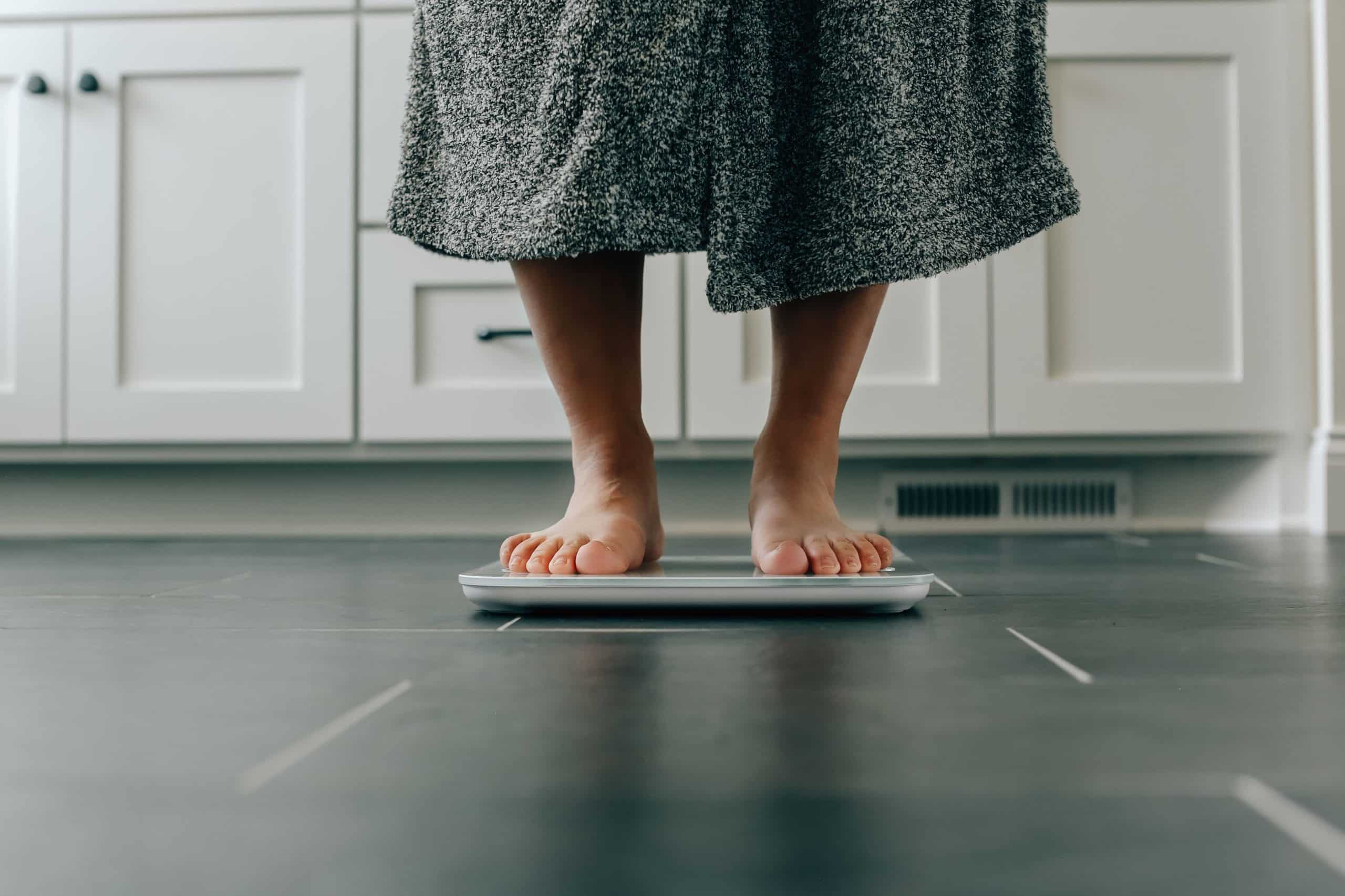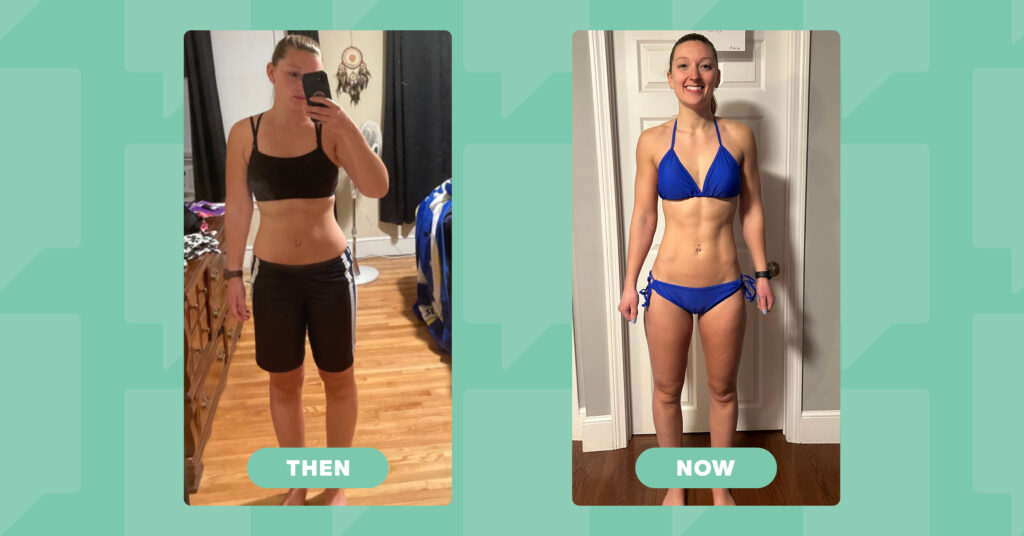For weight loss to happen we all know that the key is to find a method that works for us to eat less calories than we are burning and to stick to that plan for a long enough time to see results. There are lots of options out there for achieving this goal whether it’s following a specific diet program, changing the way you eat in a more flexible way, getting to the gym more, walking more or a combination of two or more of these in any number of various options. Any diet you follow to lose weight inherently requires restricting calories at an amount that is less than what your body needs for your weight to stay the same. To eat less calories, you will have to make some changes in your eating patterns that can include eating different types of foods such as,
- selecting lower energy-dense foods more often (for example eating more fruits, vegetables, leaner meats and lower-fat dairy products),
- limiting snacking in between meals,
- setting boundaries on the times you eat each day, or
- even removing foods that are specifically challenging for you (can anyone else NOT stick to one serving size from a gallon container?!).
There is always the option for some flexibility in food choices and eating patterns during weight loss BUT you will have to follow some guidance that results in eating less calories if weight loss is your goal.
When deciding on a plan for weight loss, another thing to consider is how quickly you want to lose weight. While most people will, of course, say they want to hit their goals tomorrow :), realistically there will be at least a few weeks or months of commitment required to achieve any goal related to changes in body composition or body weight. There are a lot of factors to consider when deciding whether a quick or gradual approach to weight loss is best for you.
What does a quick versus gradual weight loss mean?
There is no set definition and is truly dependent on your personal goals. You will see “gradual weight loss” sometimes defined as 1-2 pounds or a loss of 0.5 – 1% of body weight per week. However, this is a very general guideline that is not appropriate across the board. Someone who has over 50 pounds to lose will have different expectations of weight loss per week than another person who would like to lose 10. As such, I prefer a more flexible definition that considers what is required to achieve each option versus a definition based on the resultant weight loss on the scale.
To me, a quick weight loss can be defined as requiring a larger calorie deficit (you are eating much less calorie that you are expending) and a gradual weight loss is defined as a more moderate calorie deficit (a small reduction in calories consumed compared to calories burned). To follow, I will outline some of the pros and cons of aiming for a quick versus more gradual weight loss approach according to what insights research has for us as well as my personal experience as a registered dietitian and nutrition coach.
Benefits of Aiming for Quick Weight Loss
As I described above, a “quick weight loss” is one that requires sticking to a larger calorie deficit. This means eating significantly fewer calories than you are burning per day, consistently over a period of time (can be weeks or a few months). One of the biggest benefits of this approach to achieving more rapid weight loss is that you get the dieting phase done! If you commit to a deeper deficit for a few weeks and hit your weight loss goals, you can more quickly start to add calories back into your diet and return to eating more daily. Following a diet to lose weight is not typically considered to be fun – no one likes to feel hungry, tired or irritable so the quicker you can push through that phase, the better off you may be.
There is also some research that suggests that people who lose weight more quickly, especially at the beginning of a diet, tend to lose more weight overall, may keep that weight off for a longer period of time (Astrup A & Rossner S, 2000; Nackers L, et al., 2010). Other research has also found some enhanced benefits related to changes in metabolic factors with a rapid versus gradual approach. For example, one study that compared a rapid versus gradual weight loss program where participants were support to lose 5% of their body weight over either 5 weeks or 15 weeks found that the participants in the rapid, 5 week, weight loss program saw greater reductions in LDL and fasting blood sugar and better improvements in insulin resistance (Ashtaey-Larky D, et al., 2017).
In my personal experience working with members, I also am well aware of the benefits associated with seeing weight loss on the scale. Helping someone lose weight quickly can feel really encouraging and can help with excitement to stay committed to the plan, however, there are many reasons that I do not support staying in a large calorie deficit or aiming for rapid weight loss for more than a short period of time (a few weeks at most).
Challenges associated with quick weight loss
While losing weight quickly may sound great, there are, however, a few reasons that aiming for a more rapid weight loss is not the best fit for everyone. For one, this approach requires someone to be in a deep calorie deficit. This means you are eating much less than your body is expending. Some of the common feelings that people experience when dieting such as hunger, tiredness, moodiness, brain fog all may feel more intense and they also may impact your life in other ways too.
Behaviorally, you’re likely going to have to make choices during a deep deficit that do not transfer to long-term behaviors that you’ll need to keep up. Things such as no snacking, no alcohol, setting time limits for when you start or stop eating for a day can all assist with getting into a calorie deficit and may be necessary for rapid weight loss. Skipping meals, replacing meals with shakes, bulking meals up with some many veggies and protein to ward off hunger in such a way that is not maintainable long-term may be required. There’s also much less flexibility to fit in meals out with friends and you may feel low energy that could impact your desire to get your steps or workouts in. Overall this approach requires a high level of commitment without a lot of wiggle room for meals or days off.
It’s also important to note that rapid weight loss is associated with an increased risk for some medical complications. For example, in patients undergoing bariatric surgery where very rapid weight loss occurs, there is a high rate of cholecystitis that may require a cholecystectomy in some cases (Manatsathit W, et al., 2016). While this is an extreme level of rapid weight loss, it is important to understand that risk is increased under a rapid weight loss situation.
I typically only consider a rapid weight loss approach for a short period of time (a few weeks at most) and with members who I know will be dedicated to sticking to a strict plan. If someone has a lot of weight to lose, there may be short periods of time that a deeper deficit can be incorporated for a boost in weight loss but this is not something I recommend too often or to be followed long term.
Benefits of aiming for a more gradual weight loss
Approaching weight loss at a more gradual pace requires a more moderate calorie deficit. One of the most important benefits of this approach is that you can likely eat and exercise in a way that the structure will be more transferable to behaviors you will want to sustain long-term. Ultimately, my goal is not to help people just lose weight but to also approach their eating and activity differently and a moderate approach to weight loss is more supportive of that. You will still have to make some changes to your diet to eat a little bit less such as reducing snacking and alcoholic drinks, selecting more low energy-dense foods or whatever method you chose but there is also space for some treats or a drink here and there while still sticking to your plan.
This approach overall is more supportive of making small, sustainable changes and also will be easier to transition to your long-term eating lifestyle. Once you have hit your weight loss goals, rather than making huge changes to your eating, you can simply increase the volume of what you are already eating or make room for some additional splurges every so often.
Additionally, because you may not feel quite as hungry and tired with a gradual weight loss approach, this can leave you feeling like you have more energy to workout and move your body. During weight loss, it is very likely that you will lose some fat free muscle mass along with body fat but including adequate protein and strength training to your plan can help reduce the loss of muscle. With a moderate calorie deficit, you also have more room to fit in more protein. Consuming adequate protein and lifting weights are two of the most important factors you can manage to help reduce loss of muscle mass during weight loss (Trouwborst, et al., 2018; Willoughby D, et al., 2018). In the study mentioned above where participants achieved the same amount of weight loss over either a 5 or 15 week period, while there were benefits to the rapid weight loss program for metabolic health markers, this study found better markers of body composition change in the slower weight loss program (Ashtaey-Larky D, et al., 2017). The participants with the slower approach lost more inches off their waist and hips, more fat mass and less lean body mass then the rapid weight loss program. As a result of the body composition changes, the slower weight loss group also saw less of a decrease in their resting metabolic rate than the rapid loss group. Other research supports similar findings with participants eating more during a weight loss program losing less fat free mass than those eating less (Vink R, et al., 2016).
Challenges with a gradual weight loss
The biggest challenge with a slower weight loss plan is that weight loss will take a longer period of time. It is hard to stick to a weight loss diet so extending the time period beyond weeks to many months or years can put you at higher risk for diet fatigue, falling off your plan and making it more challenging overall to reach your goals. For many people, hunger may be ok to manage in the short term but managing it daily for months at a time can be really tough!
One of the benefits of a rapid weight loss plan is that you see results more regularly. Seeing the scale move can feel encouraging and help motivate you to stick to your plan. Alternatively, putting in a lot of effort and not losing weight, can have the opposite result and be very discouraging.
Research has also found that there may not be a benefit to a gradual approach as far as weight loss maintenance is concerned. In one randomized controlled trial that compared weight loss participants assigned to lose 15% of their body weight either through a rapid 12 week weight loss program or a gradual 36 week program found no differences between the groups in their ability to maintain the weight they lost (Purcell K et al, 2014). During this study, a larger percentage of the participants in the rapid program lost a significant amount of weight (81% of the participants in the rapid weight loss program lost at least 12.5% of their body weight while only 50% in the gradual weight loss participants lost that amount during the weight loss phase) and about 70% of participants in both groups regained most of the weight they lost 2.5 – 3 years later. Therefore in this study, the speed of the weight loss approach did not seem to impact the ability to sustain the changes to keep weight off long-term.
Recommendations
There is no one correct answer for whether you should aim to lose weight quickly or take a more gradual approach. Many many different factors need to be considered when deciding what is best for you. I recommend that you weigh all the pros and cons of each option, complete a deep reflection of your personal dedication to the process and decide what is best for you based on your goals and how close you are to them already.
If you only have a few pounds to lose, it may be best to buckle down and grit through a quick, deep deficit to get in and get out of the dieting process as quickly as possible. It’s important that you recognize that the goal of this approach is not to do this long-term and you likely will not be building habits that you can or should continue in your lifestyle.
If you have a larger amount of weight to lose, I generally recommend that you think about your long term goal and then break that goal up into segments. You may want to break your big goal into smaller segments that include short time periods where more rapid weight loss is the focus. However, most of your time should be spent with a more moderate approach that encourages following habits that you can translate to a long-term lifestyle change.
With either of these options, it is my belief that you will be most successful and efficient in achieving your goals if you do two things;
- select a method for tracking and monitoring your behaviors and results (Burke et al., 2011)
- hire a coach to help you develop your plan and keep you accountable to doing what you need to do to achieve it (Kennel, 2018)
You, along with your coach, can determine the best approach to support you achieving your goals and get you out of the focus on a diet for weight loss and move on to other goals that excite you.
References
Ashtary-Larky D, et al. (2017). Rapid Weight Loss vs. Slow Weight Loss: Which is More Effective on Body Composition and Metabolic Risk Factors?. International journal of endocrinology and metabolism, 15(3), e13249. https://doi.org/10.5812/ijem.13249
Astrup A, & Rössner S. (2000). Lessons from obesity management programmes: greater initial weight loss improves long-term maintenance. Obesity reviews : an official journal of the International Association for the Study of Obesity, 1(1), 17–19. https://doi.org/10.1046/j.1467-789x.2000.00004.x
Burke L., et al.(2011).Self-Monitoring in Weight Loss: A Systematic Review of the Literature, Journal of the American Dietetic Association, 111(1), 92-102, https://doi.org/10.1016/j.jada.2010.10.008.
Kennel J. (2018). Health and Wellness Coaching Improves Weight and Nutrition Behaviors. American Journal of Lifestyle Medicine, 12(6):448-450. doi:10.1177/1559827618792846
Manatsathit W, et al. (2016).The incidence of cholelithiasis after sleeve gastrectomy and its association with weight loss: A two-centre retrospective cohort study. International Journal of Surgery, 30,13-18. https://doi.org/10.1016/j.ijsu.2016.03.060.
Nackers l, et al.. (2010). The association between rate of initial weight loss and long-term success in obesity treatment: does slow and steady win the race?. International Journal of Behavioral Medicine, 17(3), 161–167. https://doi.org/10.1007/s12529-010-9092-y
Purcell K, et al. (2014). The effect of rate of weight loss on long-term weight management: a randomised controlled trial, The Lancet Diabetes & Endocrinology, 2(12), 954-962, https://doi.org/10.1016/S2213-8587(14)70200-1.
Trouwborst I, et al. (2018). Exercise and Nutrition Strategies to Counteract Sarcopenic Obesity. Nutrients, 10(5), 605. https://doi.org/10.3390/nu10050605
Vink R, et al. (2016), The effect of rate of weight loss on long-term weight regain in adults with overweight and obesity. Obesity, 24, 321-327. https://doi.org/10.1002/oby.21346
Willoughby D, et al. (2018). Body Composition Changes in Weight Loss: Strategies and Supplementation for Maintaining Lean Body Mass, a Brief Review. Nutrients, 10(12), 1876. https://doi.org/10.3390/nu10121876









